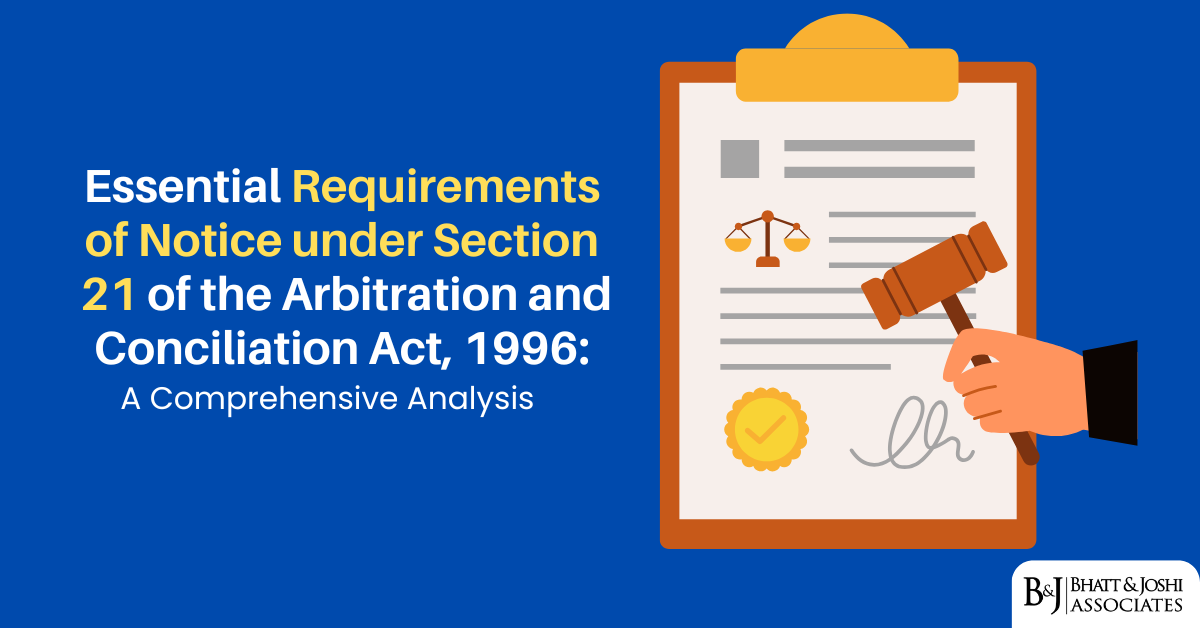Introduction
The Arbitration and Conciliation Act, 1996 represents a paradigm shift in India’s approach to alternative dispute resolution, fundamentally transforming how commercial disputes are resolved outside traditional court systems. The Act, which came into force on August 22, 1996, was designed to expedite commercial dispute resolution through private arbitration mechanisms, replacing the outdated Arbitration Act of 1940 that had become increasingly problematic due to judicial delays and procedural complexities. The legislative intent behind the 1996 Act was to create a robust framework that would minimize judicial intervention while maximizing party autonomy in dispute resolution. This statutory framework governs all aspects of arbitration proceedings, whether they are domestic, international, or involve enforcement of foreign arbitral awards. The Act draws heavily from the UNCITRAL Model Law on International Commercial Arbitration, thereby aligning Indian arbitration law with international best practices. The notice under Section 21 of the Act occupies a pivotal position within this framework, serving as the statutory gateway that formally commences arbitral proceedings. The provision reads: “Unless otherwise agreed by the parties, the arbitral proceedings in respect of a particular dispute commence on the date on which a request for that dispute to be referred to arbitration is received by the respondent.” This seemingly straightforward provision has generated extensive judicial commentary and interpretation, establishing it as one of the most crucial procedural requirements in Indian arbitration law.
Historical Context and Legislative Evolution
The genesis of modern arbitration law in India can be traced back to the colonial period, but the true evolution began with the recognition that India needed a contemporary dispute resolution mechanism that could handle the complexities of modern commercial transactions. The 1996 Act was a response to the inadequacies of the earlier arbitration legislation, which had become synonymous with procedural delays and excessive judicial interference.
The Law Commission of India, in its various reports, emphasized the need for a comprehensive arbitration statute that would reduce the burden on courts while providing parties with efficient dispute resolution mechanisms. The Commission’s 176th Report specifically addressed the definitional challenges surrounding domestic and international arbitration, leading to clearer legislative formulations that would eventually influence the interpretation of procedural requirements under the Act.
Understanding Section 21: The Commencement Provision
Statutory Framework and Textual Analysis
Section 21 of the Arbitration and Conciliation Act, 1996, establishes the temporal milestone for the commencement of arbitral proceedings. The provision operates on the principle of party autonomy, beginning with the phrase “unless otherwise agreed by the parties,” which underscores the consensual nature of arbitration as a dispute resolution mechanism.
The statutory language requires that a “request for that dispute to be referred to arbitration” must be received by the respondent for proceedings to commence. This formulation raises several interpretative questions: What constitutes a valid request? When is such a request deemed to have been received? What are the essential ingredients that such a request must contain?
Interaction with Section 3: Receipt of Written Communications
The operation of Section 21 is intrinsically linked with Section 3 of the Act, which governs the receipt of written communications. Section 3 provides a comprehensive framework for determining when a written communication is deemed to have been received:
“Unless otherwise agreed by the parties, any written communication is deemed to have been received if it is delivered to the addressee personally or at his place of business, habitual residence or mailing address; and if none of the places referred to in clause (a) can be found after making a reasonable inquiry, a written communication is deemed to have been received if it is sent to the addressee’s last known place of business, habitual residence or mailing address by registered letter or by any other means which provides a record of the attempt to deliver it.”
The provision further stipulates that “the communication is deemed to have been received on the day it is delivered.” This creates a clear temporal framework that eliminates ambiguity regarding the commencement date of arbitral proceedings, which has significant implications for limitation periods and procedural timelines.
Mandatory Nature of Section 21 Notice
Judicial Pronouncements on Compulsory Compliance
The Delhi High Court in Alupro Building Systems Pvt. Ltd. v. Ozone Overseas Pvt. Ltd. (2017) definitively held that prior notice under Section 21 of the Act is mandatory before referral of disputes to arbitration, and without such notice, arbitration proceedings that are commenced are unsustainable in law.
Justice S. Murlidhar, delivering the judgment in the Alupro case, provided comprehensive reasoning for treating Section 21 compliance as mandatory rather than directory. The Court observed that the statutory scheme of the Act revolves around party consensus and mutual agreement at all stages of arbitration proceedings. Section 21 serves as the foundational mechanism for achieving this consensus by formally notifying the other party of the intention to invoke arbitration.
The judgment emphasized that arbitration, being a consensual dispute resolution mechanism, requires both parties to be aware of the commencement of proceedings. The notice under Section 21 serves multiple purposes: it informs the respondent of the nature of claims, provides an opportunity to contest the admissibility of claims at the threshold, and facilitates the appointment of arbitrators through mutual agreement.
Rationale Behind Compliance with Section 21 Notice
The mandatory nature of Section 21 compliance stems from several foundational principles of arbitration law:
Party Autonomy and Informed Consent: Arbitration derives its legitimacy from the voluntary submission of parties to the arbitral process. The notice requirement ensures that both parties are fully informed about the disputes being referred to arbitration and can make informed decisions about their participation in the process.
Procedural Fairness: The notice serves as a mechanism for ensuring procedural fairness by giving the respondent an opportunity to understand the claims against them and respond appropriately. This includes the right to raise preliminary objections, question the arbitrability of disputes, or challenge the arbitrator’s appointment.
Limitation and Time-Barred Claims: The notice under Section 21 triggers the commencement of arbitral proceedings, which has direct implications for the computation of limitation periods. Parties can assess whether claims are time-barred and raise appropriate defenses.
Arbitrator Appointment Process: Most arbitration agreements require mutual agreement for arbitrator appointment. The Section 21 notice initiates this process by informing the respondent of the need to participate in arbitrator selection.
Essential Ingredients of a Valid Notice under Section 21
Substantive Requirements of a Valid Section 21 Notice
Based on judicial precedents and statutory interpretation, a valid notice under Section 21 must contain several essential elements:
Clear Identification of Parties: The notice must clearly identify all parties to the arbitration agreement, including their complete names and addresses. This ensures that there is no ambiguity about who is invoking arbitration and against whom the proceedings are being commenced.
Reference to the Arbitration Agreement: The notice must specifically refer to and quote the arbitration clause under which the arbitration is being invoked. This establishes the legal basis for the arbitral proceedings and demonstrates that the parties have previously agreed to resolve their disputes through arbitration.
Nature of Commercial Relationship: The notice should describe the commercial relationship between the parties, typically by referring to the underlying contract or agreement that contains the arbitration clause. This provides context for the disputes being referred to arbitration.
Factual Foundation: The notice must set out the facts that constitute the cause of action, providing sufficient detail to enable the respondent to understand the nature of the disputes. This does not require exhaustive pleadings but should contain enough information to identify the specific disagreements being referred to arbitration.
Clear Statement of Claims: While detailed pleadings are not required at the notice stage, the document must clearly articulate the claims being made against the respondent. This includes identifying breaches of contract, amounts claimed, and any other relief sought.
Explicit Request for Arbitration: The notice must contain an unequivocal request that the disputes be referred to arbitration. Mere setting out of claims and disputes without a clear request for arbitration would not suffice.
Arbitrator Appointment Request: If the arbitration agreement requires mutual appointment of arbitrators, the notice should request the respondent to nominate their arbitrator within a specified timeframe.
Response Timeline: The notice should prescribe a reasonable deadline for the respondent to respond, particularly regarding arbitrator appointment and any preliminary objections.
Case Law Analysis: D.P. Construction v. Vishvaraj Environment
In M/s D.P. Construction v. M/s Vishvaraj Environment Private Ltd., the court established crucial principles regarding the essential ingredients of a valid Section 21 notice. The judgment held that:
“The notice invoking arbitration ought to be absolutely clear with reference to the arbitration clause and with clear intent of calling upon the opposite party to proceed for the appointment of an arbitrator and for reference of disputes to arbitration. Unless there is a request by the party to refer the disputes to arbitration, mere setting out of the claims and disputes would not suffice.”
The court further observed that when parties have not triggered the agreed procedure for reference of disputes to arbitration, the question of failure does not arise, and therefore, the precondition for invoking jurisdiction under Section 11 of the Act is not satisfied. This aspect goes to the root of the matter and affects the court’s jurisdiction to appoint arbitrators.
The judgment emphasized that there are significant legal consequences that follow once a valid notice is issued under Section 21, including the computation of limitation periods. Therefore, courts must scrutinize whether the requirements of a valid notice have been satisfied before proceeding with applications under Section 11.
Procedural Implications and Legal Consequences of Section 21 Notice`
Commencement of Arbitral Proceedings
The issuance and receipt of a valid notice under Section 21 marks the formal commencement of arbitral proceedings. This has several important legal consequences:
Limitation Period Computation: The Supreme Court in Nortel Networks Private Ltd. noted the importance of Section 21 for computing the date from which the limitation period begins for applications under Section 11 of the Act.
Jurisdiction under Section 11: Courts can exercise jurisdiction under Section 11 to appoint arbitrators only after a valid notice under Section 21 has been issued and the respondent has failed to comply with the arbitrator appointment process.
Binding Nature of Arbitration Agreement: Once valid notice is issued, both parties become bound by the arbitration agreement to proceed with arbitral resolution of the specified disputes.
Rights and Obligations of Parties
Respondent’s Rights: Upon receiving a valid Section 21 notice, the respondent acquires several rights, including the right to question the arbitrability of disputes, challenge the arbitrator’s qualifications, raise preliminary objections about jurisdiction, and participate in the arbitrator appointment process.
Claimant’s Obligations: The claimant must ensure that the notice complies with all statutory requirements and provides sufficient information to enable meaningful participation by the respondent in the arbitral process.
Contemporary Judicial Trends and Interpretations
Flexibility in Application of Section 21 Notice Requirement
While the mandatory nature of Section 21 has been firmly established, courts have also recognized that rigid application of technical requirements should not defeat the substantive purpose of the provision. Several High Courts have adopted a pragmatic approach, examining whether the rationale behind the notice requirement has been fulfilled even if there are minor procedural deficiencies.
Orissa High Court Perspective: The Orissa High Court has observed that the Alupro decision making notice of arbitration mandatory had no application where the rationale of giving notice is fulfilled and no prejudice is caused.
Substantial Compliance Doctrine: Courts have increasingly applied the doctrine of substantial compliance, focusing on whether the essential purpose of the notice has been achieved rather than insisting on strict literal compliance with every technical requirement.
Waiver of the Requirement for Section 21 Notice
Section 21 begins with the phrase “unless otherwise agreed by the parties,” which creates scope for parties to waive the notice requirement through express agreement. However, such waiver must be clear and unambiguous, and courts have been reluctant to infer waiver from conduct or circumstances.
Express Waiver: Parties can expressly agree in their arbitration clause or through subsequent agreement that no formal notice under Section 21 is required for commencing arbitral proceedings.
Implied Waiver: Courts have been cautious about recognizing implied waiver, typically requiring clear evidence that both parties understood and accepted the commencement of arbitration without formal notice.
Comparative Analysis with International Practices
UNCITRAL Model Law Influence
The formulation of Section 21 draws inspiration from Article 21 of the UNCITRAL Model Law on International Commercial Arbitration, which provides that “unless otherwise agreed by the parties, the arbitral proceedings in respect of a particular dispute commence on the date on which a request for that dispute to be referred to arbitration is received by the respondent.”
International Best Practices: Leading arbitration jurisdictions have similar requirements for formal commencement of arbitral proceedings, though the specific procedural requirements may vary.
Institutional Rules: Major arbitral institutions like the ICC, LCIA, and SIAC have developed comprehensive rules governing the commencement of arbitral proceedings, often requiring detailed Requests for Arbitration that serve similar functions to the Section 21 notice.
Practical Considerations for Legal Practitioners
Guidelines for Drafting Valid Section 21 Notices
Legal practitioners must ensure that Section 21 notices are comprehensive and comply with all judicial guidelines. Key drafting considerations include:
Comprehensive Case Analysis: Before drafting the notice, practitioners should conduct thorough analysis of the underlying dispute, the arbitration agreement, and applicable procedural requirements.
Clear and Precise Language: The notice should use clear, unambiguous language that leaves no room for misinterpretation about the claimant’s intention to invoke arbitration.
Supporting Documentation: The notice should be accompanied by relevant documents, including copies of the contract containing the arbitration clause and evidence supporting the claims being made.
Service Requirements: Practitioners must ensure that the notice is served in accordance with Section 3 of the Act and obtain proper acknowledgment of receipt.
Common Pitfalls and How to Avoid Them
Vague or Ambiguous Language: Notices that do not clearly express the intention to refer disputes to arbitration may be deemed invalid. Practitioners should use explicit language requesting arbitration.
Inadequate Factual Foundation: Notices that fail to provide sufficient factual basis for the claims may be challenged. While exhaustive pleadings are not required, the notice should contain enough detail to enable the respondent to understand the nature of the disputes.
Improper Service: Failure to comply with Section 3 requirements for service of written communications can render the notice ineffective. Practitioners should carefully follow prescribed service procedures.
Missing Essential Elements: Omission of key elements such as arbitration clause reference, arbitrator appointment request, or response timeline can invalidate the notice.
Recent Developments and Future Outlook
Legislative Reforms
The Arbitration and Conciliation (Amendment) Acts of 2015, 2019, and 2021 have introduced various reforms to streamline arbitration proceedings, though Section 21 has remained largely unchanged. The focus has been on reducing judicial intervention and expediting proceedings.
Fast Track Arbitration: Recent amendments have introduced fast-track arbitration procedures for smaller disputes, which may require modified notice procedures.
Institutional Arbitration: There has been growing emphasis on institutional arbitration, which often has its own procedural rules for commencing proceedings that may supplement or modify Section 21 requirements.
Emerging Jurisprudential Trends
Courts are increasingly recognizing the need to balance technical compliance with substantive justice. Recent decisions suggest a trend toward:
Purposive Interpretation: Courts are adopting purposive interpretation of Section 21, focusing on whether the essential objectives of the provision have been achieved.
Prevention of Technical Defeats: There is growing judicial reluctance to allow purely technical deficiencies in notices to defeat otherwise valid arbitration proceedings.
Harmonization with Commercial Reality: Courts are considering the commercial context and business practices in interpreting Section 21 requirements.
International Arbitration Considerations
Cross-Border Disputes
In international arbitration cases governed by the Act, Section 21 requirements must be harmonized with international practices and the expectations of foreign parties. This requires careful consideration of:
Cultural and Legal Differences: Parties from different legal traditions may have varying expectations about procedural requirements, necessitating clear communication about Indian law requirements.
Language Considerations: Notices in international arbitrations may need to be in languages understood by all parties, which may require translation and additional procedural steps.
Service Across Borders: Service of Section 21 notices on foreign parties requires compliance with international service rules and may involve diplomatic channels or specific treaty procedures.
Technology and Modern Communication
Electronic Service
With increasing digitization of legal processes, questions arise about electronic service of Section 21 notices. While the Act does not explicitly address electronic communication, Section 3 provides flexibility for service “by any other means which provides a record of the attempt to deliver it.”
Email and Electronic Platforms: Courts have generally accepted email service of arbitration notices, provided there is proper acknowledgment and record of delivery.
Digital Signatures: The use of digital signatures for arbitration notices is becoming more common, particularly in commercial disputes where parties have previously communicated electronically.
Conclusion
Section 21 of the Arbitration and Conciliation Act, 1996, serves as the foundational provision for commencing arbitral proceedings in India. The mandatory nature of this requirement, as established by landmark judgments like Alupro Building Systems, ensures that arbitration proceedings are commenced only after proper notice to all parties.
The provision embodies fundamental principles of natural justice, party autonomy, and procedural fairness that are essential to the integrity of the arbitral process. While courts have established strict requirements for compliance with Section 21, there is also recognition of the need for practical flexibility to prevent technical deficiencies from defeating substantive justice.
Legal practitioners must approach Section 21 notices with careful attention to both statutory requirements and judicial interpretations. The notice serves multiple purposes beyond mere formal commencement—it establishes the foundation for fair and effective arbitral proceedings by ensuring informed participation of all parties.
As Indian arbitration law continues to evolve, Section 21 will likely remain a critical provision requiring careful navigation. The balance between mandatory compliance and practical flexibility will continue to be refined through judicial interpretation, always with the overarching goal of promoting efficient and fair dispute resolution through arbitration.
The importance of Section 21 extends beyond mere procedural compliance—it represents the commitment of Indian arbitration law to maintaining the consensual nature of arbitration while ensuring that all parties have adequate notice and opportunity to participate meaningfully in the resolution of their disputes. This balance between formality and flexibility will continue to shape the future development of arbitration practice in India.
References
- Alupro Building Systems Pvt. Ltd. v. Ozone Overseas Pvt. Ltd., (2017) SCC OnLine Del 7228, Delhi High Court.
- M/s D.P. Construction v. M/s Vishvaraj Environment Private Ltd., (2021) SCC OnLine SC 1029, Supreme Court of India.
- Nortel Networks Private Ltd. case regarding limitation computation under Section 21.
- The Arbitration and Conciliation Act, 1996, available at https://www.indiacode.nic.in/bitstream/123456789/1978/3/a1996-26.pdf
- Law Commission of India, 176th Report on Arbitration and Conciliation (Amendment) Bill 2003.
- “Essential ingredients of the notice invoking arbitration under Section 21,” ELP Law, February 5, 2024, https://elplaw.in/leadership/elp-arbitration-update-essential-ingredients-of-the-notice-invoking-arbitration-under-section-21-of-the-arbitration-conciliation-act-1996/
- “Section 21 of Arbitration and Conciliation Act, 1996,” iPleaders, October 10, 2023, https://blog.ipleaders.in/section-21-of-arbitration-and-conciliation-act-1996/
- “Notice required prior to referral of disputes,” India Business Law Journal, September 12, 2022, https://law.asia/notice-required-prior-to-referral-of-disputes/
- “Section 21 of the Arbitration and Conciliation Act 1996: Mandatory or Directory?” VIA Mediation Centre, https://viamediationcentre.org/readnews/MTU4Nw==/Section-21-of-the-Arbitration-and-Conciliation-Act-1996-Mandatory-or-Directory
- “Notice Under Section 21 Is Mandatory Before Referring The Disputes To Arbitration,” Mondaq, January 31, 2018, https://www.mondaq.com/india/Litigation-Mediation-Arbitration/669120/Notice-Under-Section-21-Is-Mandatory-Before-Referring-The-Disputes-To-Arbitration
PDF Links to Full Judgments
- https://bhattandjoshiassociates.s3.ap-south-1.amazonaws.com/judgements/Alupro_Building_Systems_Pvt_Ltd_vs_Ozone_Overseas_Pvt_Ltd_on_28_February_2017.PDF
- https://bhattandjoshiassociates.s3.ap-south-1.amazonaws.com/judgements/M_S_D_P_Construction_Thr_Its_Prop_Mr_vs_M_S_Vishvaraj_Environment_Pvt_Ltd_on_6_July_2022.PDF
- https://bhattandjoshiassociates.s3.ap-south-1.amazonaws.com/judgements/a1996-26.pdf
- https://bhattandjoshiassociates.s3.ap-south-1.amazonaws.com/judgements/176Th_Report_On_The_Arbitration_And_Conciliation_Amendment_Bill_2001.PDF














